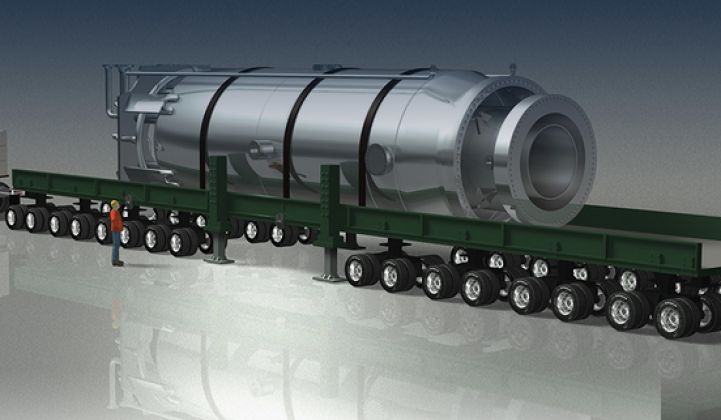President Obama is using his executive authority to encourage the government to invest in next-generation nuclear technologies.
Last week, the president issued an executive order mandating a 40 percent cut in carbon dioxide emissions across government agencies. Buried in the list of qualifying clean energy technologies was a reference to small modular nuclear technologies -- a new breed of reactors that are smaller, safer and less capital-intensive than traditional light water reactors.
As part of the targets, government agencies must get 30 percent of energy from "alternative" technologies by 2025. Those include conventional renewables, conventional fossil fuels with carbon capture, and small modular nuclear reactors. The mention of nuclear was first reported by Matthew Bandyk of SNL.
The Obama administration has long expressed its support for the nuclear industry. Both of the administration's energy secretaries, Steven Chu and Ernest Moniz, have been stalwart advocates of the industry.
"If we want to make a serious dent in carbon dioxide emissions -- not to mention having cleaner air and cleaner water -- then nuclear power has to be on the table," wrote former secretary Chu on his official Facebook page in 2010.
Last February, the Department of Energy finalized a $6.5 billion loan guarantee for two 1,100-megawatt reactors at the Vogtle nuclear site being developed by Southern Company. (The reactors, which are the first developed in the U.S. in 30 years, are billions of dollars over budget and nearly two years behind schedule.)
With the remaining funds for loan guarantees, the Department of Energy made $12.5 billion available last December for advanced reactor designs or enrichment processes.
There's a growing list of technologies being supported by the feds. But President Obama's executive order is the first time small modular nuclear has been designated for government procurement. The executive order does not necessarily mean that federal agencies will buy electricity from next-generation nuclear facilities; however, it does add an extra incentive for the military or government labs to enter into contracts -- assuming technologies are ready within the next decade.
American companies working on advanced designs include NuScale Power, TerraPower, Transatomic Power, Westinghouse and Babcock & Wilcox.
Although more money is trickling in from the government and venture capitalists for these firms, they still have many years of testing and permitting to go through before approaching commercial scale. Supporters of the industry have called for additional federal funds to test new reactor designs, as well as an overhaul of permitting processes at the Nuclear Regulatory Commission to speed up deployment when those designs are ready.
The Obama administration's new rules for federal facilities won't help in those needed areas. But they may provide startups with a first customer when they're ready to commercialize.
Speaking to SNL, NuScale's Chief Commercial Officer, Mike McGough, said that adding small modular nuclear to government clean energy targets "absolutely will nudge folks closer" to purchasing electricity from one of its early projects.



